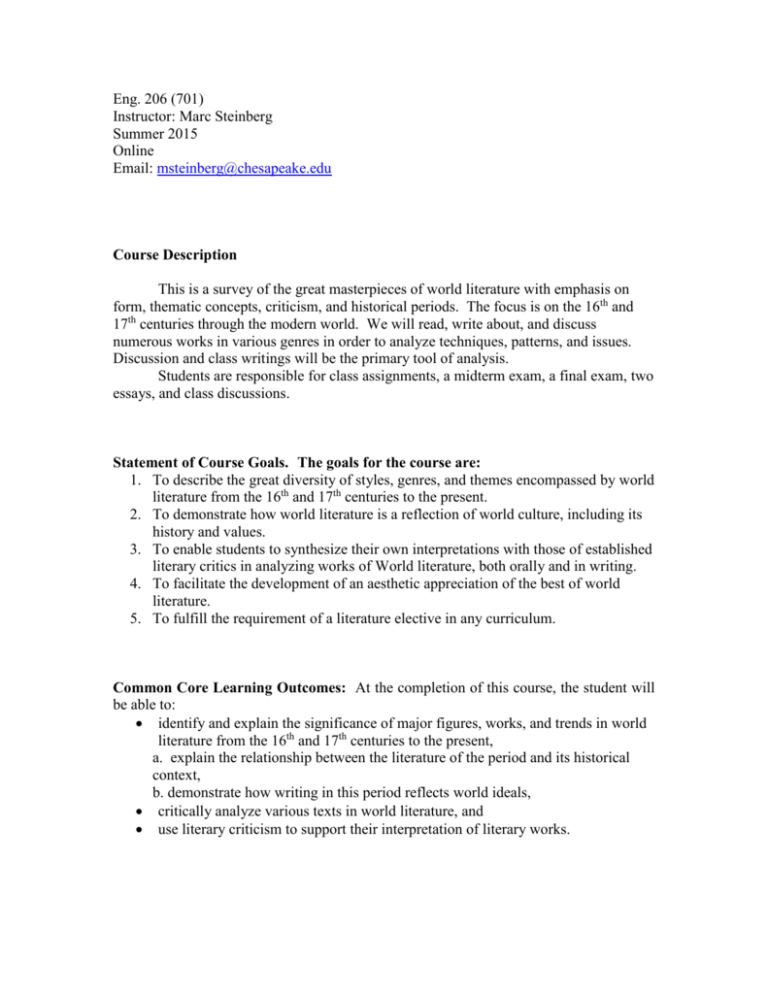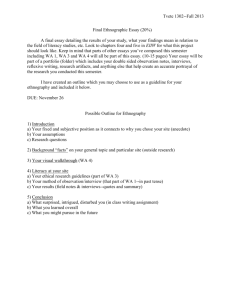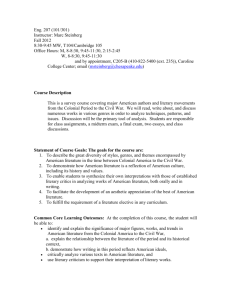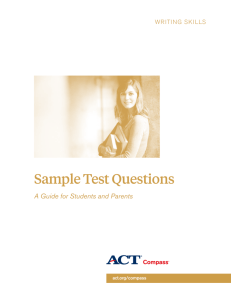Syllabus
advertisement

Eng. 206 (701) Instructor: Marc Steinberg Summer 2015 Online Email: msteinberg@chesapeake.edu Course Description This is a survey of the great masterpieces of world literature with emphasis on form, thematic concepts, criticism, and historical periods. The focus is on the 16th and 17th centuries through the modern world. We will read, write about, and discuss numerous works in various genres in order to analyze techniques, patterns, and issues. Discussion and class writings will be the primary tool of analysis. Students are responsible for class assignments, a midterm exam, a final exam, two essays, and class discussions. Statement of Course Goals. The goals for the course are: 1. To describe the great diversity of styles, genres, and themes encompassed by world literature from the 16th and 17th centuries to the present. 2. To demonstrate how world literature is a reflection of world culture, including its history and values. 3. To enable students to synthesize their own interpretations with those of established literary critics in analyzing works of World literature, both orally and in writing. 4. To facilitate the development of an aesthetic appreciation of the best of world literature. 5. To fulfill the requirement of a literature elective in any curriculum. Common Core Learning Outcomes: At the completion of this course, the student will be able to: identify and explain the significance of major figures, works, and trends in world literature from the 16th and 17th centuries to the present, a. explain the relationship between the literature of the period and its historical context, b. demonstrate how writing in this period reflects world ideals, critically analyze various texts in world literature, and use literary criticism to support their interpretation of literary works. Texts and Materials The Norton Anthology World Literature: Shorter Third Edition. Volume 2. Supplemental material will be found linked to Canvas. Expectations Students are expected to be prepared for class postings, discussions, and assignments. No late assignments will be accepted without prior permission. (Only in extraordinary circumstances will an extension of the deadline be granted; late submissions are subject to penalty.) Essays that are more than one week late can be submitted for credit but not for a grade. Class writings, drafts, and essays will be due by the end of the week (Sunday at midnight), unless noted otherwise. Grading *Midterm *Final *Essay #1 *Essay #2 Class writings Discussions** 15% 15% 20% 20% 20% 10% *All of these must be submitted for a chance at passing the class. **Students are expected to regularly participate in online discussions. Students should try to post at least 2 responses per week (either original posts or responses to other students). Academic Instruction Emergency Management Plan In the event that Chesapeake College needs to close for an extended period of time due to a flu pandemic, severe weather event, or other emergency situation, consideration will be given to the timing and duration of the closure as follows: 1. Closure during the semester for up to one week—there will be an opportunity to make up work missed without significant alteration to the semester calendar. 2. Closure extending beyond one week (or in situations where classes are cancelled on the same days/evenings over multiple weeks)—the College may extend the length of the semester. Depending on the timing of the closure, scheduled breaks, end of semester dates, and/or the processing of final grades might be impacted. Students can acquire information about closures on the College website or by calling 410-822-5400 or 410-228-4360. Chesapeake College courses held at off campus sites will follow the protocol of the host facility. ________________________________________________________________________ Schedule Week One (6/10-14) Introductions Alexander Pope—“An Essay on Man” (90-97) Mary Wollstonecraft—“A Vindication of the Rights of Woman” (160-63) Sor Juana Ines de la Cruz—“Philosophical Satire” (84-86) Matsuo Basho—“The Narrow Road to the Deep North“ (325-36) Week Two (6/15-21) William Blake—“The Chimney Sweeper” (584-85) Blake—“The Tyger” (586-87) Blake—“London” (587-88) William Wordsworth—“Composed upon Westminster Bridge, September 3, 1802” (596) Wordsworth—“The World is Too Much with Us” (596) John Keats—“Ode on a Grecian Urn” (611-12) Frederick Douglass—Narrative of the life of Frederick Douglass, An American Slave (517-73, selections) Week Three (6/22-28) Alfred, Lord Tennyson—“Ulysses” (644-45) Walt Whitman—“Song of Myself” (648-53) Charles Baudelaire—“To the Reader” (656-57) Ghalib—“I’ve made my home next door to you” (624-25) Rabindranath Tagore—“Punishment” (964-70) Higuchi Ichiyo—“Separate Ways“ (973-79) Week Four (6/29-7/5) Arthur Rimbaud—“A Season in Hell” (686-88) Emily Dickinson—341, 465, 712, 1129 (670-75) “Annancy, Monkey and Tiger” (989-90) “Breer Rabbit and Aunt Nancy” (990-91) Franz Kafka—“The Metamorphosis” (1204-35) Essay #1 draft due (not graded) Midterm Week Five (7/7-12 [7/6, no classes]) “The Night Chant” (998-1001) Luigi Pirandello—“Six Characters in Search of an Author” (1250-90) Lu Xun—“Diary of a Madman” (1238-46) Essay #1 due Week Six (7/13-19) Leopold Sedar Senghor—“Black Woman” (1444-45) Senghor—“Prayer to the Masks” (1445-46) Senghor—“Elegy of the Circumcised” (1450-51) Virginia Woolf—A Room of One’s Own (1313-35) Jorge Luis Borges—“The Garden of Forking Paths” (1337-44) T.S. Eliot—“The Love Song of J. Alfred Prufrock” (1385-88) Week Seven (7/20-26) Samuel Beckett—“Endgame” (1525-53) Tadeusz Borowski—“This Way for the Gas, Ladies and Gentlemen” (1454-66) Paul Celan—“Deathfugue” (1469-70) Clarice Lispector—“The Daydreams of a Drunk Woman” (1555-60) Mahmoud Darwish—“Identity Card” (1607-09) Essay #2 draft due (not graded) Week Eight (7/27-29) Leslie Marmon Silko—“Yellow Woman” (1684-90) Jamaica Kincaid—“Girl” (1725-26) Gabriel Garcia Marquez—“Death Constant Beyond Love” (1653-58) Essay #2 due Final (7/30-8/3)










